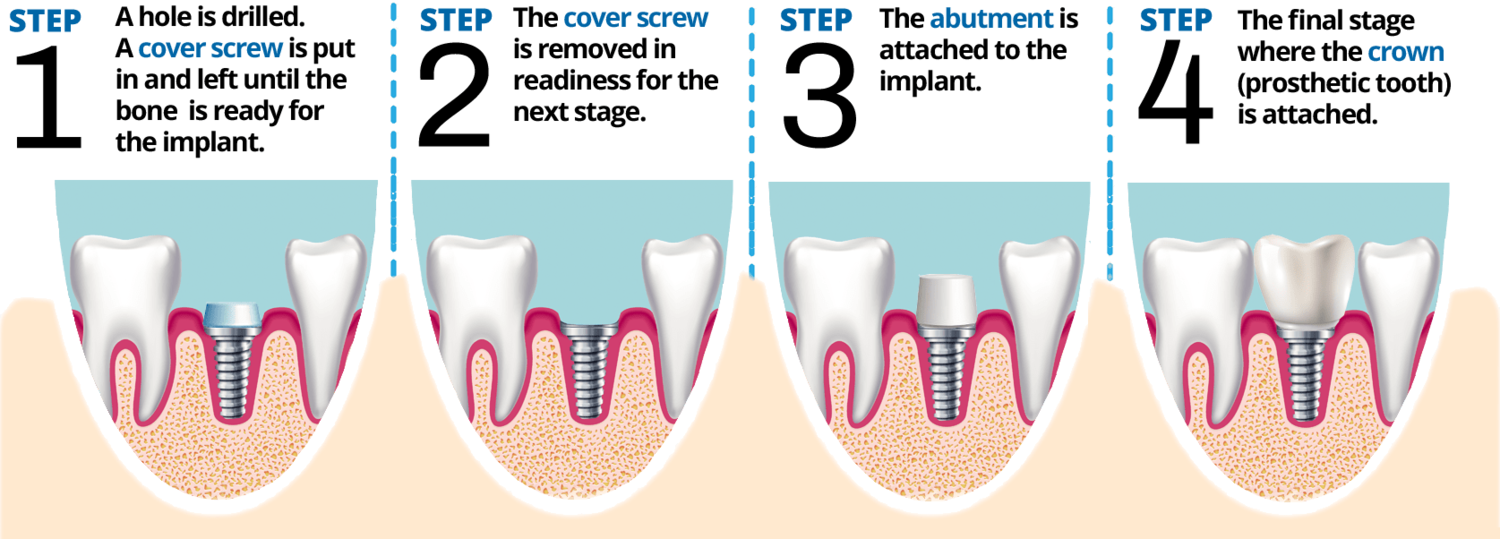Everything You Need to Know About Dental Implants
Implants are designed to look, feel, and function like your natural teeth. Because of their advantages over traditional tooth replacement options like dentures, dental implants provide excellent long-term value and can be a terrific investment in long-term oral health.
A dental implant is a metal screw used to replace a missing tooth or gap. The implant screw is surgically placed into the bone where the root would have previously been. After the bone has healed and connected to the implant, a special crown is custom made at our lab in accordance to the surrounding teeth to ensure it is the same shade/colour and shape and follows the same way you bite. The crown is normally placed 4 - 6 months after the implant is inserted. If it is a front tooth, we have options to temporarily fill the gap, including a retainer or temporary denture.
A dental implant can be used to support a bridge, crown, denture or a full arch. If you have one or more missing teeth, a dental implant might be an option to consider. In saying so, not all patients are eligible for this procedure and many factors are taken into consideration, however by booking a consult with Dr. Luma, she can advise to you whether you are eligible candidate for a dental implant.
Some of the factors that are considered include;
your jawbone health
if you smoke cigarettes
whether you have enough bone to hold the implant
any medical conditions you have
any medications you take
the health of your gums
The dental implant process usually takes more than 6 months in total, sometimes more or less depending on case by case. The first step is a consult with a Cone Beam CT Scan (CBCT x-ray) which is a large 3D image taken of the teeth for the specialist and dentist to view the gum, bone and gap in order to see where the implant can be placed. Then once the planning stage is over, the minor surgery occurs, where the entire jaw is numbed so that you don’t feel anything at all. The implant is then placed, and the area is left to heal for 3-6 months. Once the bone grows over the implant, this means it is held in place properly, and the crown can be made by the laboratory. This crown is then fixed onto the screw, filling the gap.
Having a gap in your teeth is not ideal and can cause many issues after a few years including eating becoming more difficult, especially when there are multiple gaps. Difficulty eating can cause food to be inefficiently chewed, and when the digestive system tries to digest the food that is too large, this can cause stomach issues. Having a gap will also lead to the adjacent tooth (tooth above or below the gap) to ‘over grow’, and when biting down this will put more pressure on this tooth, causing it to also have issues such as Cracked Tooth Syndrome which can then lead to more extractions or expensive dental work. When a tooth is lost it also eventually causes the cheeks of the face to sink in and a wrinkle to form as there is nothing holding the cheek and the muscles will adjust accordingly.
Dental implants are the most advantageous option when replacing missing teeth as other options, such as dental bridges or dentures. For example, a dental bridge consists of removing some tooth structure of the teeth surrounding the gap and placing a unit of crowns over the teeth next to the gap which are connected to a floating tooth to sit in the place of the gap. This is great if the teeth next to the gap are heavily filled or decayed, but not ideal if we are compromising healthy tooth structure.
Secondly, a denture can be very uncomfortable and unconventional, with many issues of its own. Dentures are not permanent, need to be taken out during the night and must be cleaned properly. If the denture covers the palate (roof of mouth), you may also experience significant loss of taste when eating. It is also significantly less cosmetically appealing and can be embarrassing for many people.
Dental implants may be a good option if:
You have one or more missing teeth
You have a bridge that needs to be replaced
Your dentures are slipping, clicking or keeping you from eating what you want
You are experiencing bite problems or pain because of a missing tooth
Benefits of Implants:
Improved appearance, speech, chewing ability and oral health
Provides the confidence to smile, eat, and engage in social activities
Preserves the remaining healthy bone after extraction.
Prevents the adjacent and opposing teeth from moving
Can restore one, multiple or whole arches
Assist in retention of a removable prosthesis
Implants have been proven to improve people’s confidence, overall oral health, improve the ability to eat normally and are made to restore a person’s teeth to their natural state.
You only get one smile. Make it last a lifetime with dental implants.
Written by Sana Hussain - 15 August 2023


